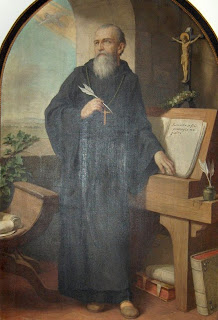John Fisher was born in 1459 at Beverly, Yorkshire, England. He studied theology in Cambridge and in 1491, he occupied the vicarage of Northallerton, Yorkshire. Three years after, he became proctor of his university and soon after was appointed Master of Michaelhouse. It was also during this time that he became chaplain and confessor to Margaret Beaufort, Countess of Richmond and Derby and mother of King Henry VII.
By Bull dated 14 October, 1504, Fisher became Bishop of Rochester and in the same year was elected Chancellor of Cambridge University. He also acted as tutor to Prince Henry who later became King Henry VIII.
Fisher was known to be a good preacher and had denounced various abuses in the Church.
When Henry VIII called all the Bishops of England and asked them to declare his marriage with Catherine of Aragon invalid. Fisher did not give his consent for he fear offending God more than the King, adding that just like St. John the Baptist, he was ready to die on behalf of the indissolubility of marriage. Henry VIII was so enraged that he issued a document entitled “The Supremacy Act” declaring that he was henceforth be considered the supreme head of the Church in England. Those who refused to sign the act were immediately imprisoned.
In May, 1532, Sir Thomas More resigned the chancellorship and in August, the Archbishop of Canterbury, died and was succeeded by Cranmer. By January, Henry secretly married Anne Boleyn; Cranmer's consecration took place two months after. All this time, St. John Fisher preached publicly against the divorce and a week after Cranmer’s consecration, Fisher was arrested and was sent to the Tower of London.
The purpose of this arrest was to prevent Bishop Fisher from opposing the sentence of divorce which Cranmer pronounced in May, as well as the coronation of Anne Boleyn a month after. In March, 1534, a special bill of attainder against the Bishop of Rochester and others was passed forfeiting all their goods and personal estate. In the same session, the Act of Succession was passed, declaring that all who should be called upon to do so were compelled to take an oath of succession, acknowledging Henry and Anne as legitimate heirs to the throne.
Several efforts were made to induce to change his mind, but without effect.
Bishop John Fisher along with his friend Sir Thomas More gave up their lives in testimony to the indissolubility of marriage and to the unity of the Church.
The Bishop’s friend Thomas More, said to have written this about John, "I reckon in this realm no one man, in wisdom, learning, and long approved virtue together, meet to be matched and compared with him."
John Fisher had always been a man of principles and he met death with a calm dignified courage. He blessed his executioner before speaking briefly to the crowd and said his prayer of thanksgiving to God
Of all the English bishops, only Bishop John Fisher of Rochester publicly opposed Henry VIII's Oath of Allegiance, which unlawfully declared him the head of the Church of England. He was canonized in 1935 by Pope Pius XI.
Patronage:
St. John Fisher is the patron saint of bishops, theologians, and the Diocese of Rochester in England. He is also considered a patron of those who defend the sanctity of marriage and the rights of the Church.
Prayer to St John Fisher:
O God, who in your providence chose St. John Fisher to be a faithful bishop and martyr, grant that we may be strengthened by his example and intercession in our own faith and dedication to your Church. Through his intercession, may we remain steadfast in our beliefs and committed to upholding the sanctity of marriage and the truth of your Gospel. We ask this through our Lord Jesus Christ, your Son, who lives and reigns with you in the unity of the Holy Spirit, one God, forever and ever. Amen.
Reflection:
John Fisher showed how it is to be a good leader. God had entrusted him with this task and he defended it to the point of death.
As St. Paul says, “and keep your faith and a clear conscience. Some men have not listened to their conscience and have made a ruin of their faith.” 1 Timothy 1:19
St. John Fisher's life serves as a powerful reminder of the importance of unwavering faith, even in the face of adversity and persecution. His commitment to the truth and his refusal to compromise his principles, even at the cost of his own life, inspire us to stand firm in our own faith and convictions. In a world filled with challenges to our beliefs and values, St. John Fisher's example encourages us to remain faithful to our Christian heritage and to defend the teachings of the Church with courage and love. Let us reflect on his life and pray for the strength to follow his example in our own lives, always seeking to uphold the truth and remain steadfast in our faith.








